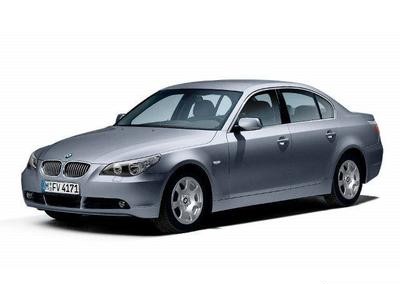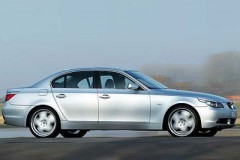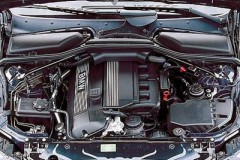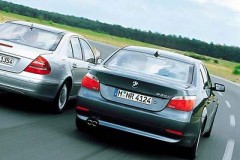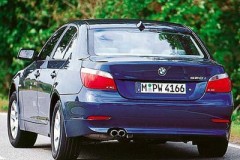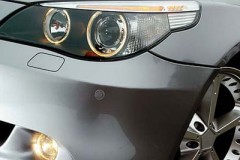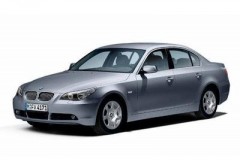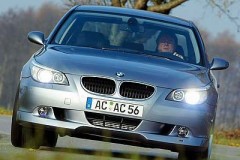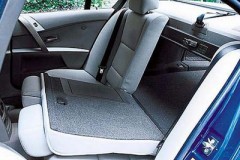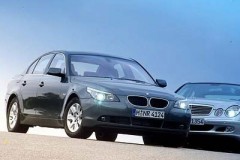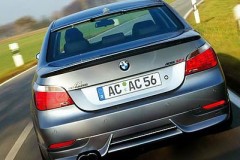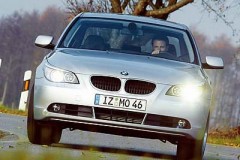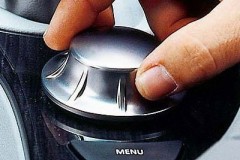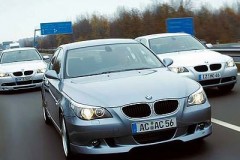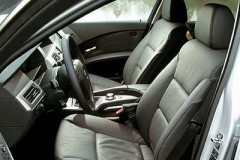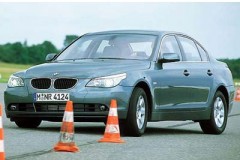BMW 5 series 2003 E60 Sedan
The car with a lot of extras is comfortable, but at the same time allows you to feel the power of the engine. Many extras do not interfere with car dynamics. Thanks to the pneumatic suspension, the car feels much more stable on the road. The car electronics report every fault that the machine has, thus informing the owner in good time about the necessary repairs.
read all BMW 5 series reviews
This generation of BMW 5 series E60 has been produced from July, 2003 to March, 2007. We can provide information about 33 modifications of this generation. 2003 BMW 5 series is available with four wheel (4x4) drive (6 versions) and classical rear wheel drive (27 versions).
This BMW is available with nine petrol engines with displacement from 2.2 to 4.8 litres and power of from 170 to 367 horsepower un five diesel engines with displacement from 2.0 to 3.0 litres and power of from 163 to 272 horsepower.
The car is available with both manual (16 versions), as well as automatic (17 versions) gearbox.
BMW 5 series 2003 E60 sedan average fuel consumption in combined cycle for petrol engine is from 8.5 to 11 litres per 100km, whereas for diesel engine - from 5.9 to 8.2 litres per 100km. The most fuel efficient BMW 5 series 2003 E60 sedan petrol engine version is BMW 523i, consuming 8.5 litres per 100km. While the most fuel efficient BMW 5 series 2003 E60 sedan diesel - BMW 520d for 100 kilometers consumes 5.9 liters of diesel.
According to user reviews, BMW 5 series real-world fuel consumption is on average about approximately for 10 percents higher as the manufacturer's claimed fuel economy (on average +9% for petrol engines and +10% for diesel engines). For a more detailed actual fuel economy of each model, select a specific BMW 5 series modification.
BMW 5 series 2003 E60 sedan CO2 emissions for petrol engine are from 205 to 267 grams per kilometer, whereas for diesel engine - from 158 to 219 grams per kilometer. From BMW 5 series with petrol engines the lowest CO2 emissions has BMW 523i which produces an average of 205 grams of CO2 per kilometer. In turn, from the BMW 5 series diesels least CO2 distributes BMW 520d - 158 grams per km.
The best acceleration from 0 to 100 km/h - 5.5 seconds has BMW 550i version, conversely the tardiest one is BMW 520i reaching this speed only in 9.9 seconds. The maximum top speed is 250 km/h for the 4.8 petrol 8-cylinder 367 hp version (BMW 550i) and 11 other versions.
Lenght of BMW 5 series is 484 cm, it is large car. For comparison - BMW 5 series is about 4 cm longer than Audi A6 sedan. BMW 5 series gross weight is from 2010 to 2220 kg (depending on modification), this car is about 8 percent heavier than the average for this age and class of vehicles. BMW 5 series trunk space is 520 litres, by folding down all rear seats boot capacity can be increased to 520 litres.
This BMW is quite costly - it can be purchased (in Latvia, EU) for around 4300 €. According to user reviews, average BMW 5 series repair costs are 500 € per year. Users calculated BMW 5 series 2003 cost of ownership for this generation, got average 3700 € cost per year and 0.33 € cost per one kilometer. Fuel costs were estimated at around 49%, while repair and maintenance costs - around 19% from total. We have an excellent car cost calculator, calculate ownership costs of BMW 5 series for your situation and driving habits here! Our review authors managed to sell their BMW 5 series in average time of 3 weeks. Below you will find more detailed information about BMW 5 series prices and costs.
In user reviews BMW 5 series received average grade 8.3 (from 10) - better than average rate for same years cars (7.8). Ratings are quite controversial, both positive and not so good, read more in the reviews below. 92% of reviewers would recommend this car to the friend.
BMW 5 series modifications
| Modification | Engine | Power | Consumption | Gearbox | Drive type |
|---|---|---|---|---|---|
|
BMW 520d
Sep 2005 — Mar 2007 Most fuel efficient diesel version |
2.0 Diesel | 163 HP | 5.9 l/100km | Manual (6) | Rear wheel |
| BMW 520d Sep 2005 — Mar 2007 | 2.0 Diesel | 163 HP | 6.9 l/100km | Automatic (6) | Rear wheel |
| BMW 520i Jul 2003 — Mar 2005 | 2.2 Petrol | 170 HP | 9.0 l/100km | Manual (6) | Rear wheel |
| BMW 520i Sep 2003 — Mar 2005 | 2.2 Petrol | 170 HP | 9.8 l/100km | Automatic (5) | Rear wheel |
|
BMW 523i
Mar 2005 — Mar 2007 Most fuel efficient petrol version |
2.5 Petrol | 177 HP | 8.5 l/100km | Manual (6) | Rear wheel |
| BMW 523i Mar 2005 — Mar 2007 | 2.5 Petrol | 177 HP | 9.3 l/100km | Automatic (5) | Rear wheel |
| BMW 525i Sep 2003 — Mar 2005 | 2.5 Petrol | 192 HP | 9.4 l/100km | Manual (6) | Rear wheel |
| BMW 525i Sep 2003 — Mar 2005 | 2.5 Petrol | 192 HP | 9.9 l/100km | Automatic (6) | Rear wheel |
| BMW 525i Mar 2005 — Mar 2007 | 2.5 Petrol | 218 HP | 8.7 l/100km | Manual (6) | Rear wheel |
| BMW 525i Mar 2005 — Mar 2007 | 2.5 Petrol | 218 HP | 9.4 l/100km | Automatic (6) | Rear wheel |
| BMW 525xi 4x4 Mar 2005 — Mar 2007 | 2.5 Petrol | 218 HP | 9.6 l/100km | Manual (6) | All wheel |
| BMW 525xi 4x4 Mar 2005 — Mar 2007 | 2.5 Petrol | 218 HP | 10.0 l/100km | Automatic (6) | All wheel |
| BMW 525d Jan 2004 — Mar 2007 | 2.5 Diesel | 177 HP | 6.7 l/100km | Manual (6) | Rear wheel |
| BMW 525d Jan 2004 — Mar 2007 | 2.5 Diesel | 177 HP | 7.8 l/100km | Automatic (6) | Rear wheel |
| BMW 530i Jul 2003 — Mar 2005 | 3.0 Petrol | 231 HP | 9.8 l/100km | Manual (6) | Rear wheel |
| BMW 530i Jul 2003 — Mar 2005 | 3.0 Petrol | 231 HP | 9.9 l/100km | Automatic (6) | Rear wheel |
| BMW 530i Mar 2005 — Mar 2007 | 3.0 Petrol | 258 HP | 8.8 l/100km | Manual (6) | Rear wheel |
| BMW 530i Mar 2005 — Mar 2007 | 3.0 Petrol | 258 HP | 9.3 l/100km | Automatic (6) | Rear wheel |
| BMW 530xi 4x4 Mar 2005 — Mar 2007 | 3.0 Petrol | 258 HP | 9.7 l/100km | Manual (6) | All wheel |
| BMW 530xi 4x4 Mar 2005 — Mar 2007 | 3.0 Petrol | 258 HP | 10.0 l/100km | Automatic (6) | All wheel |
| BMW 530d Jul 2003 — Sep 2005 | 3.0 Diesel | 218 HP | 6.9 l/100km | Manual (6) | Rear wheel |
| BMW 530d Jul 2003 — Sep 2005 | 3.0 Diesel | 218 HP | 7.8 l/100km | Automatic (6) | Rear wheel |
| BMW 530d Sep 2005 — Mar 2007 | 3.0 Diesel | 231 HP | 6.7 l/100km | Manual (6) | Rear wheel |
| BMW 530d Sep 2005 — Mar 2007 | 3.0 Diesel | 231 HP | 7.5 l/100km | Automatic (6) | Rear wheel |
| BMW 530xd 4x4 Sep 2005 — Mar 2007 | 3.0 Diesel | 231 HP | 7.6 l/100km | Manual (6) | All wheel |
| BMW 530xd 4x4 Sep 2005 — Mar 2007 | 3.0 Diesel | 231 HP | 8.2 l/100km | Automatic (6) | All wheel |
|
BMW 535d
Sep 2004 — Mar 2007 Most powerfull diesel version (272 HP) |
3.0 Diesel | 272 HP | 8.0 l/100km | Automatic (6) | Rear wheel |
| BMW 540i Mar 2006 — Mar 2007 | 4.0 Petrol | 306 HP | 11.0 l/100km | Manual (6) | Rear wheel |
| BMW 540i Mar 2006 — Mar 2007 | 4.0 Petrol | 306 HP | 10.0 l/100km | Automatic (6) | Rear wheel |
| BMW 545i Sep 2003 — Sep 2005 | 4.4 Petrol | 333 HP | 11.0 l/100km | Manual (6) | Rear wheel |
| BMW 545i Sep 2003 — Sep 2005 | 4.4 Petrol | 333 HP | 11.0 l/100km | Automatic (6) | Rear wheel |
|
BMW 550i
Sep 2005 — Mar 2007 Most dynamic version - 100 km/h in 5.5 seconds |
4.8 Petrol | 367 HP | 11.0 l/100km | Manual (6) | Rear wheel |
|
BMW 550i
Sep 2005 — Mar 2007 Most powerfull petrol version (367 HP) |
4.8 Petrol | 367 HP | 11.0 l/100km | Automatic (6) | Rear wheel |
BMW 5 series safety
During safety testing BMW 5 series has obtained 4 stars from five, which means good safety level.
Adults (driver and passenger) safety of BMW 5 series is evaluated with four stars, children safety - with four stars, and for pedestrian protection BMW 5 series got one star.
BMW 5 series prices
BMW 5 series 2003 - 2007 sedan price in Latvia is from 2400 € to 7500 €.
Comparing to analogical vehicles BMW 5 series price is very high - BMW 5 series is approximately for 65 percents more expensive then average sedans of this age (compare sedans 2003 - 2007 prices).
| Year | Lowest | Average | Highest | Availability |
|---|---|---|---|---|
| BMW 5 series 2007 price | 4500 € | 6000 € | 7500 € | |
| BMW 5 series 2006 price | 3000 € | 3800 € | 4700 € | |
| BMW 5 series 2005 price | 3600 € | 4500 € | 5500 € | |
| BMW 5 series 2004 price | 2800 € | 4100 € | 5500 € | |
| BMW 5 series 2003 price | 2400 € | 3100 € | 3500 € |
BMW 5 series total costs of ownership
How much really costs to own BMW 5 series? Users calculated BMW 5 series 2003 cost of ownership for this generation, got average 3700 € cost per year and 0.33 € cost per one kilometer.
BMW 5 series 2003 total costs of ownership calculator
Calculate total cost of ownership of the BMW 5 series, including purchase, insurance, maintenance, taxes and other costs based on how you use your vehicle.
BMW 5 series mileage
To estimate approximate BMW 5 series mileage, please choose production year
2003 2004 2005 2006 2007

Check Vehicle's History
Access 300+ million damage records from 900+ data sources across 40+ countries.
Get 20% off your VIN check using this form!
BMW 5 series reliability and quality
According to yearly reports of vehicle inspection service BMW 5 series reliability is little below average. In the roadworthiness tests in 2018 defects were detected in an average of 28.7 percent of BMW 5 series of this generation (on average 13 years old at the time of inspection). The average failure rate for a vehicles of the same age was 26.9%.
BMW 5 series 2003 E60 sedan features (options)
Percentage of BMW 5 series with corresponding feature (option)
84% Rain sensor
82% Conditioning
81% Tire pressure control
66% Xenon headlights
66% Metallic paint
64% Cruise control
53% Leather upholstery
52% Electrically adjustable seats
51% Rear parking sensors
48% Front parking sensors
46% Adjustable steering wheel
45% Heated seats
40% Navigation
40% Dimming mirrors
27% Electrically adjustable steering wheel
25% Sunroof
21% Bi-xenon lights
20% Auxiliary heating
16%
BMW 5 series 2003 E60 sedan photo images
Similar cars to BMW 5 series 2003
Cars similar and most compared to BMW 5 series 2003. Click on the image to view the car's specifications or on the "Compare..." link to compare cars.
- higher safety
- lower price
- higher safety
- also available in 2WD
- fewer faults
- fewer faults
- roomier boot
- lower fuel consumption
- lower fuel consumption
- lower price
- higher safety
- automatic transmission only
- also available in 2WD
- lower price
BMW 5 series reviews
Total 104 BMW 5 series owner reviews
Pros: The car with a lot of extras is comfortable, but at the same time allows you to feel the power of the engine. Many extras do not interfere with car dynamics. Thanks to the pneumatic suspension, the car feels much more stable on the road. The car electronics report every fault that the machine has, thus informing the owner in good time about the necessary repairs.
Cons: Usually the minimum repair cost is over 100 EUR, but repair visits are not frequent. Often the cars on market are seriously damaged (repair of turbines or ccc electronics defects - 1000 EUR each).The car gives the owner the will to invest in major repairs and upgrades
| Purchase year: | 2018 age of car 13 years) | Owned for | 10`000 kilometers (0 years) |
|---|---|---|---|
| Average fuel consumption: | 12.5 litres per 100km (90% urban driving) | ||
| Total cost of repairs: | 595 € | ||
Would recomend this car to the friend

